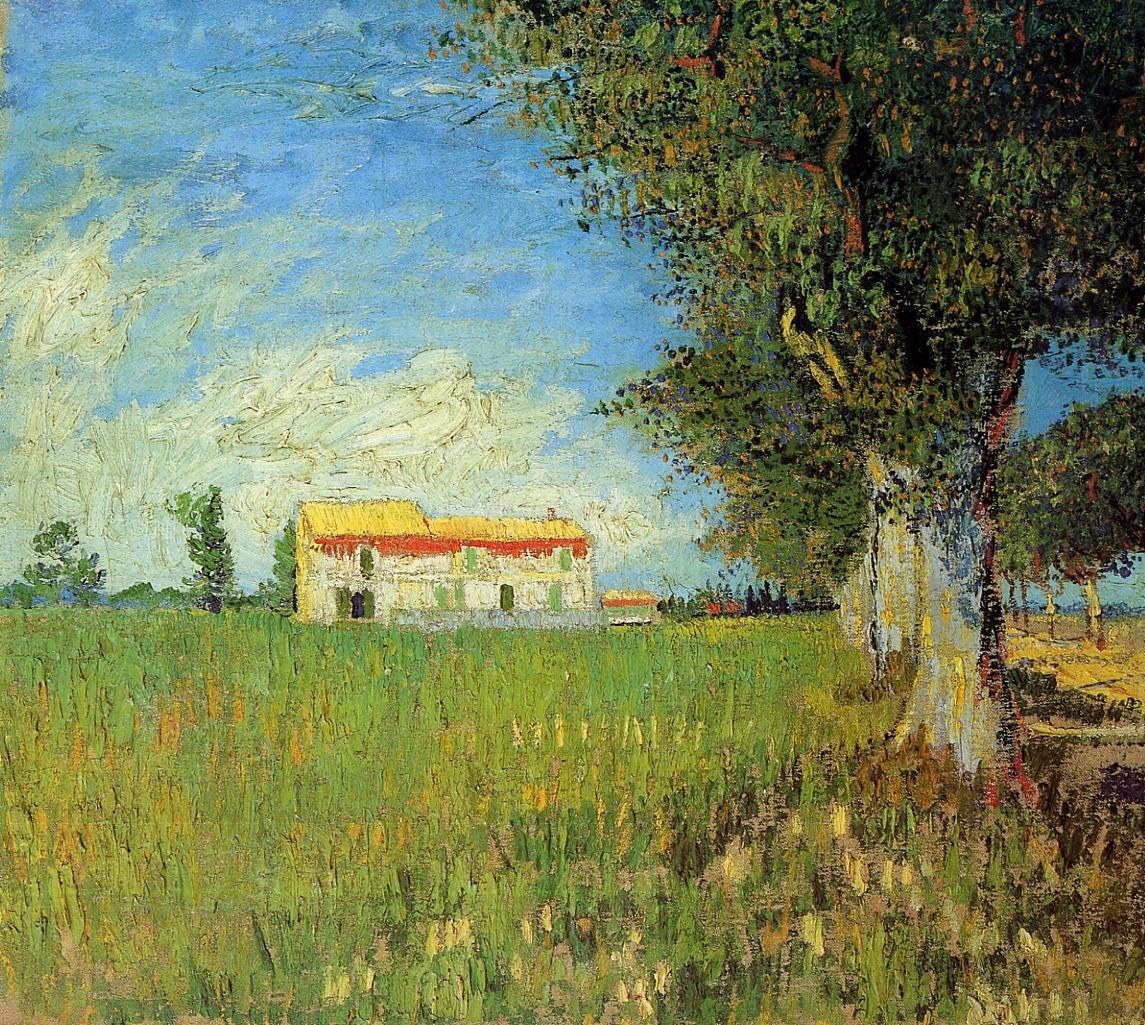5 Quick Things #326 👩🌾
homesteading, communal living, seasons for things, & re-weirding our faith
Hey there,
I love the seasonality of life (which is why, as much as I sometimes want to move to Hawaii, I think I’d miss the change in natural seasons). This is the time of year I’m tempted to throw in my hat in the game of productivity or perseverance, because as both a teacher and a mother, post-Spring Break in the school year is just hard. You’re not close enough to the end to celebrate a job well done, but you’re definitely weary from the rigamarole of books and papers and never-ending grading. As I’ve told my students and children lately, we’re in mile 20 of the school-year marathon… You’ve run a good, long race, but you still have those last few grueling miles to go. It’s not time for the shiny blanket just yet.
And yet, I say it’s good that life has seasons like this. Gratefully, not all of life is the last push in a marathon, but if I were forever in a hammock with a book in a Hawaiian garden, I know I’d grow complacent and probably bitter. These seasons that ask a lot of us ultimately grow us in discipline, fortitude, and prudence, and we’re better for it. It wouldn’t make sense if we were nonstop reaping a harvest or resting as we let the field go fallow for the winter… We need to sow, plant, water, and weed, too.
Spring tends to teach me things. This lesson is what it’s teaching me these days.

5 Quick Things ☕️
1. “American society is skeptical of children. As individuals, most of us maintain a localized hope for babies, but when it comes to those ‘powers and principalities’ that shape a cultural mood, we assume burden before gift. …The result is a collective lack of willingness to sacrifice for children that are not our own.” Phew, this piece from Mary Ellen Mitchell is good—in the twenty-first century, our culture does indeed tend to think of children as a commodity at best, burden at worst. To see them as a gift—and to live accordingly—is nothing short of counter-revolutionary.
2. Dorothy Day, farming, Catholicism, education, simplicity, and re-weirding Christianity? Yes please. I really enjoyed Katie Marquette’s conversation with Dr. Larry Chapp, someone I’ve grown to really admire the past few years: “We speak about how to return to a truly ‘lived’ Christianity, even when it makes us a bit ‘weird.’ What is the role of money? How much should we even have materially speaking? Is there a deep tension in serving the poor and also being a responsible parent? All this plus a practical discussion on how we can help others and follow Christ's foundational commandment to always care for those in need.”
3. Cal Newport is one of the writers who I’ll read pretty much no matter what he publishes. I recently finished his latest, Slow Productivity, and while it wasn’t my favorite of his, it does have good insights (especially the later half). This is a good interview with him and David Epstein on Range Widely: “I do a lot of thinking on foot, so I’m constantly walking through the streets of my small town, or, if I have something really hard to figure out, on a nearby walking trail. At the larger scale, I practice seasonality: I do little else but book writing in the summers, while, during certain academic semesters, I might instead be really busy on classes and university service.” (Speaking of seasons, re: my thoughts above... And also, speaking of something I’m going to share soon about my own upcoming writing plans.)
4. Even in the suburbs, you can grow some of your food—not necessarily to live off the grid or to stick it to some man, but because you need to be a person who grows their own food (this is what I’ve come to learn about myself, anyway). John Cuddeback shares good thoughts about reconsidering our lawns: “I think the contemporary approach to lawns as instantiated in the dominant practices of our ‘lawncare’ constitutes a crisis. Why? At issue here is much more than lawns—as important as they are. What we call ‘lawns’ can and should be an important part of most homes, and how we treat them is a key expression of how we understand our home and our relation to the natural world. Home is the place to relate meaningfully to the natural world. Home is where living in a responsible and stewardly way has its main instance. Consider the great possibility that opens before us.”
5. And finally, what a nifty—and simple—method from Jake at The Workbox for memorizing Scripture (or anything, really)!
Currently Reading, Watching, Listening 📚
Made for People, by Justin Whitmel Earley
Quotable 💬
“I do not understand the mystery of grace—only that it meets us where we are and does not leave us where it found us.”
-Anne Lamott
You're on a walk — what are you probably listening to? 🚶♀️
These responses somewhat surprised me, only because I thought music would rank higher—but then, that’s probably the last option for me as well. I do love that the most popular choice was nothing but the sounds God put around you… As for me, it’s most likely either an audiobook or the companion I’m walking with. Dog excluded.
Nature: 37.2%
Podcast: 26.8%
Companion: 19.6%
Audiobook: 12.1%
Music: 4.3%
Find this week’s poll here.
Quick Links 🔗
ICYMI 🗝
Subscribers, join in April’s book chat, posted earlier this week—we’ve got the best group of bookworms on the internet, and as always, their reading stacks will give you the best ideas for what to read next! Share with us what’s in your current stack, too.
Question(s) For You to Ponder… 🤔
What is one analog thing you can do this weekend?
Have a good weekend,
- Tsh
p.s. If it fits. (Related: cats are weird.)





Thank you for sharing Mary Ellen Mitchell's essay. It adds another piece to the puzzle of why we are battling an epidemic of chronic loneliness. I'm going to ponder this.
So much good stuff! We live in a nice-ish neighborhood and really stand out as the house that doesn’t do “lawn care.” I would like to learn more about out how to intentionally cultivate a lawn/yard in a way that isn’t the standard. (For now, we just sort of let it be. And mow.)
The first essay really touched me. I love her paraphrase of Dorothy Day: “Everybody wants a revolution but nobody wants to work in child care.” So true! I saw a line once that said “Everyone on earth is either a mother or a child.” Caring well for children is so central to our collective well-being yet it feels totally pushed to the margins of what is seen as important. I’ve felt this acutely in many ways, one being receiving more and more invites to child-free weddings in recent years.